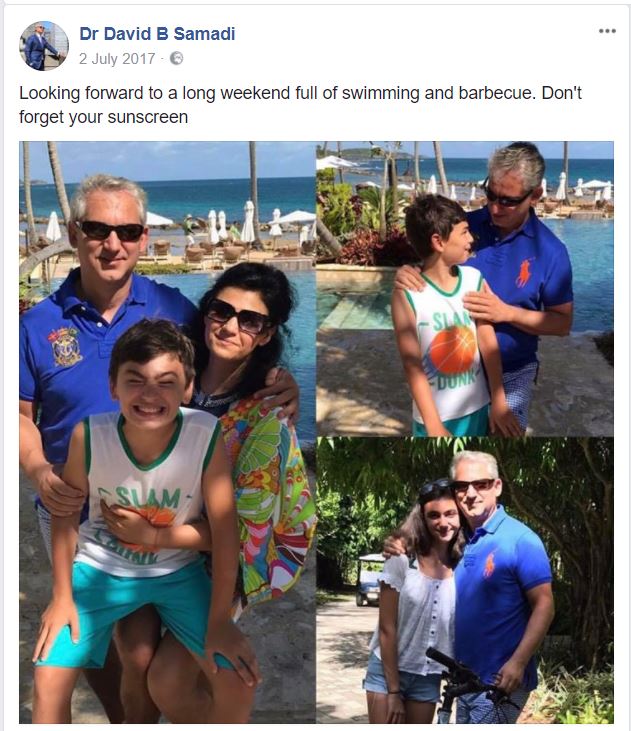Finding your balance as a doctor: Tips from David Samadi
 As a very successful doctor, David Samadi has made lots of sacrifices on the road of becoming one of the leading urological oncologists, specializing in robotics and minimally invasive surgery for prostate cancer. It is a well known fact that at the age of 15 he was forced to leave his parents and little sister Heidi in Iran and flee the country with his younger brother Dan. During the eight years of living among strangers, in Belgium, the UK and, finally, the US, the only motivation for the two was the goal to succeed. After this lonely period, their parents and little sister were finally able to fly to the US and the Samadi family was reunited.
As a very successful doctor, David Samadi has made lots of sacrifices on the road of becoming one of the leading urological oncologists, specializing in robotics and minimally invasive surgery for prostate cancer. It is a well known fact that at the age of 15 he was forced to leave his parents and little sister Heidi in Iran and flee the country with his younger brother Dan. During the eight years of living among strangers, in Belgium, the UK and, finally, the US, the only motivation for the two was the goal to succeed. After this lonely period, their parents and little sister were finally able to fly to the US and the Samadi family was reunited.
Dr. Samadi’s ambition to succeed was motivated by the sacrifices his parents were making back home in Iran. After they came to the US, his drive didn’t stop. He went on to complete his master’s degree, his training in urology and fellowships in proctology and robotic radical prostatectomy. His professional life has been on the rise ever since. He has performed over 7000 robotic prostate surgeries, pioneered the SMART technique that managed to achieve the Trifecta for most of his patients, has written many publications and held speeches internationally. More than that, he is often called a “celebrity doctor” due to his repeated appearances in Fox’s Sunday Housecall, on Fox and Friends, frequent articles in media publications, podcasts and videos on his personal sites. He even had a guest cameo on Law&Order: Criminal Intent, playing a prostate cancer doctor, raising awareness on the issue. These might appear hectic for the ordinary person, but Dr. Samadi enjoys every single facet of his professional life: “It’s a very exciting life that takes me from surgery, to broadcast news, to the Emmy Awards and then, the next day, I meet people from different countries, who I’d never meet if didn’t do what I do.”
David Samadi’s wife has been alongside him for 18 years now
In 2000, David Samadi met his wife, Sarah Danielpour, at Cedars Sinai Medical Center in Los Angeles, where she worked in Hospital Management. “I’m fortunate to have a wife who is a superb mom and a great partner,” Samadi says of his wife, who, like him, is from Iran. Together, they have two children, a daughter and a son. David Samadi’s family is a large and atypical one. Him, his brother, sister and 20 cousins are all doctors. He has 5 nephews only from his brother’s and sister’s side, so when the entire family comes together, Samadi and his wife have a full table.
His professional work does sometimes put a strain on his personal life: “My immediate family has paid the price. They would like to see much more of me”, Samadi says. Even though the thousands of patients he has had all these years have taken up a big part of the time spent in family, Samadi insists that all doctors must try to disconnect once in a while from their hospital lives and enjoy valuable time spent with their loved ones.
David Samadi’s tips for work-life balance
- Find a favorite physical activity – Dr. Samadi was captain of the soccer team back in Iran and has always been a competitive person. He is an active person and still plays tennis, golf and other sports. Practicing sports can help reduce stress, clear the thinking, increase self-confidence. Any doctor should have a physical activity that gives him 1 or 2 hours weekly of time out from his/her medical practice.
- Focus on your spirituality – Dr. Samadi was raised Jewish by his family and remembers how his dad taught him about Judaism on their 45 minutes drive to school. After all these years, even when apart from his parents, he maintained a close relationship to his spirituality: “I practice my religion every time I raise a scalpel. Taking care of all people regardless of
 religion and using my God-given talent to help others and save lives is what is imprinted on me from my faith.” David Samadi and his wife are active members of Temple Beth Shalom in Roslyn, NYC. Focusing on your religion or on whatever your inner motivation for helping people is, will give you purpose through the hard times and keep you going.
religion and using my God-given talent to help others and save lives is what is imprinted on me from my faith.” David Samadi and his wife are active members of Temple Beth Shalom in Roslyn, NYC. Focusing on your religion or on whatever your inner motivation for helping people is, will give you purpose through the hard times and keep you going. - Go on holidays – Even though your schedule might be booked throughout the entire year, your patients won’t benefit from you if you’re tired, overworked, stressed out, on the verge of a physical or emotional breakdown from all the stress and responsibility. Try to empty your schedule at least once every six months and go on a trip with your family, for 7-10 days. When you’ll return, everything will seem more bearable.
- Get enough sleep – This might feel like a dream to you, especially if you’re a surgeon, but the lack of sleep will, in time, lead to fatigue, daytime sleepiness, clumsiness and can affect the brain and cognitive functions. It could also affect your mood, your patience and overall well-being. Not sleeping enough will affect both your professional and personal life, so make sure you allow yourself to rest for as long as possible.
- Delegate tasks whenever possible – Assigning some tasks, especially administrative ones, such as scheduling, filling up forms, ordering supplies and medication, to members of your team, will clean up your plate from not so important tasks. You will be able to dedicate yourself to the important issues of your patients and will be able to leave the practice once every appointment has been met.
Balancing work and personal life is a struggle for the modern man and woman, which increases in complexity, especially for those practicing medicine. Doctors are generous persons who, more often than usual, will sacrifice their personal lives for the wellbeing of their patients. Even though this shows dedication and passion towards the profession, being one-sided helps no one: not the patient, not the doctor and not his/her family. “Balance is not something you find. It’s something you create”. In other words, you need to make continuous efforts to be happy in both areas of your life.
